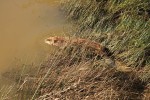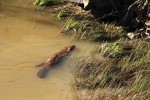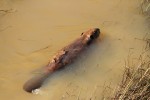Yesterday turned out to be a wonderful day, even at this distance from the conference. Alexandria Costello was generous enough to FBlive some of the wonderful talks, and I got lots of feedback about my presentation. Plus Sherry Guzzi of Sierra Wildlife Coalition was able to take and send amazing notes of the day, which made me feel like I was part of the action.
One of the exciting presentations Alex covered was by Fran Recht of the Pacific States Marine Fisheries Commission. They just released an amazing film by Freshwater Illustrations that you NEED to see and share with everyone you know. Check it out.
Isn’t that wonderful? I think will be a permanent margin feature for a while. Having ‘regular’ folk talk about the benefits of beavers is a powerful tool, and one that we should always rely on. I guess I’m kind of regular folk, or I was once. Sherry said that Gerhard Schwab’s talk about beavers in Germany emphasized having “local” experts that really make the difference. Apparently my talk had a warm reception and I got some positive feedback yesterday even from folks I’d never met. Our old friend Louise Ramsay said it was “Inspirational”, a stranger wrote and said it was so affecting he got ‘choked up’ about the kits dying, Suzanne Fouty actually quoted me in her talk later in the day, a grad student I didn’t know wrote that they came to the conference to meet me and were so sorry I wasn’t there but glad to hear me anyway, and the author Ken Goldfarb who I talked into attending wrote:
Heidi, that was really a fantastic video… I’m sure you’re very sad at not being able to attend the conference, but you should know that your virtual presentation elicited a lot of laughs, a lot of sympathetic nodding, and a very enthusiastic ovation. Incredible footage!
So I guess that sometimes it’s better to not be there and feel that you contribute than the opposite. Thes talk I’m most anxious about missing this morning is by Lorne Fitch of Cows and Fish in Alberta, I’m trying to see if I can get it streamed by some hardy soul willing to hold their phone up for an hour. I will let you know and share if I can.
Cheryl was no slacker either yesterday, and she went on the release of the beaver recently rescued in Pittsburg that they returned to Dow Wetlands. I know you’d want to see these photos. Click twice on a photo to see it larger.












 BAR HARBOR — Skip Lisle, president and chief scientist of Beaver Deceivers International, will present his nonviolent, creative approach to beaver management at College of the Atlantic’s Human Ecology Forum in the McCormick Lecture Hall on Tuesday, Feb. 21, at 4:10 p.m. The talk is free and open to the public.
BAR HARBOR — Skip Lisle, president and chief scientist of Beaver Deceivers International, will present his nonviolent, creative approach to beaver management at College of the Atlantic’s Human Ecology Forum in the McCormick Lecture Hall on Tuesday, Feb. 21, at 4:10 p.m. The talk is free and open to the public.





































